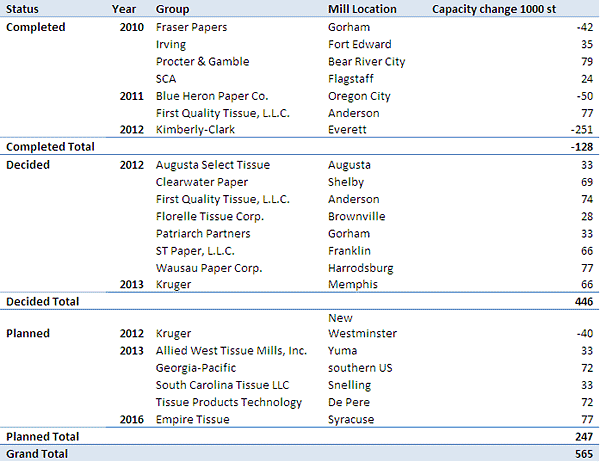
By Lindsay Gervais, Consultant at Pöyry Management Consulting
The wave of capacity investments announced in the past two years in North America created a concern for downward pressure on operating rates. However, with the closure of Kimberly-Clark’s Everett, Wash., USA, mill last year and the recently announced closure of Kruger’s two machines in British Columbia, the North American market appears to be more in balance.
Several projects are expected to be completed this year and the question going forward is if this supply discipline will continue. In addition, the closures have been concentrated in the West, raising questions about how regional supply/demand balances are developing.
Capacity Changes
Based on publicly announced capacity changes, the net capacity change between 2010 and 2016 will be 565,000 short tons. Based on Pöyry’s most recent demand forecast, demand will grow by nearly 600,000 short tons between 2012 and 2016 (1.7%/a growth rate). This indicates that the market growth will absorb the new capacity coming online, with some downward pressure on operating rates in 2012/2013 when most of the capacity is expected to become operational.

Figure 1: Tissue Capacity Changes in North America. Source: Pöyry Smart Terminal
Regional Supply/Demand Balances in the U.S.
Historically, Pöyry has estimated that the most balanced regions are the Northeast and Midwest, with over capacity in the Southeast and an under-supplied West region, where the balance is being supplied by imported products and independent converters.
Going forward, these trends appear to be continuing. A large number of the capacity additions are concentrated in the U.S. Southeast as an attractive fiber supply and other favorable facts are driving the interest. In the West, threats from imported products may be playing a factor in the competitive landscape.
Key Takeaways
The capacity closures, most notably the Everett mill, have certainly mitigated the concern of a temporary period of over-supply. Supply discipline will continue to play an important role as the market demand growth attracts investment over time.
The author of this report can be contacted at lindsay.gervais@poyry.com
TAPPI
http://tappi.org/